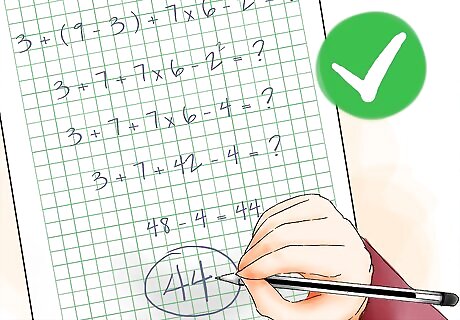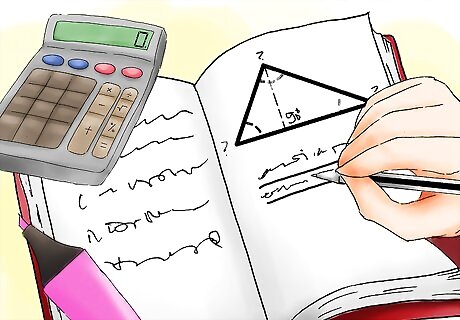
views
Making the Most out of Class

Keep a positive attitude. Math can cause stress in many people. Unfortunately, stress can hinder your memory and zap your will. If you approach geometry with a positive attitude, you are already giving yourself a good start. Math is something anyone can learn. It is a myth that some people have math brains and others don’t. With appropriate effort and support, anyone can excel in geometry. Unlike algebra, calculus, and other math subjects, geometry is more visual, and based on concrete concepts dealing with shapes and figures. You might find that even if you struggled with more abstract branches of math in the past, geometry is easy to understand, and even fun.

Go to class regularly. More than any other school subject, math is sequential, and skills and concepts build upon previous skills and concepts. If you miss one day, you are likely to be lost on the day you return, scrambling to keep up. This may lead to you losing two days of geometry, and it will be difficult to catch up. If you need to make an appointment for part of the school day, try to schedule it so that it does not interfere with your math period. If you know in advance that you are going to be absent, talk to the instructor and see whether you can get the assignments for that day to preview and complete. If you are absent, make sure you get all the work you need to complete from your instructor or a friend. If you are gone multiple days in a row, find out how long the instructor will give you to make up the work. Making up a lot of work on top of keeping up with your current work can be a daunting task. Create a calendar with your deadline. Divide up your work into smaller assignments to complete each night, until all the make-up work is complete.

Find a study partner or form a study group. You can make an agreement with a study partner to share notes if the other person is absent. Just make sure your study partner is reliable. If you form a group, you can get together with some of your classmates to review new concepts, or to review for a test. Studying with friends can be fun, and will help ease any math anxiety you might have.

Ask questions. If you get lost in the middle of class, you need to get your questions answered as soon as possible, or you risk falling further behind. Don’t be afraid to raise your hand and speak up. It is likely that if you are confused, other students in the class are confused as well. It is better to ask the teacher your questions, not your neighbor. Your neighbor may not have the right answer, or you may get in trouble for speaking in the middle of class. Also, while talking to your neighbor, you risk missing out on new information the instructor may be presenting at that time. Many people are afraid to ask questions in class because they are embarrassed, and think they will look dumb. Although it’s unlikely a classmate will think you’re dumb (in fact, asking questions can make you look smarter), it is probably worth the risk of being embarrassed for a moment in order to make sure you understand the work. If your teacher is the one making you feel bad for asking a question, talk to your parents and principal. If you have trouble getting over your fear of asking questions in front of classmates, you can always write down your questions and ask your teacher after class.
Completing Homework

Complete all your homework. Homework might seem boring or redundant, but it is important because it helps you practice applying the skills and concepts you learned during class. Plus, if you do the homework, you might realize that you do not understand a concept as well as you thought you did, and the next day you can ask your instructor for additional help.

Show all your work on your homework. Usually your teacher will require this for full credit, but it also allows you to check your work. Additionally, if you show your work, it is easier to review with your parents, teacher, or tutor, because they can see what you did for the problems and identify any misconceptions you might have, or common errors you make.

Check homework that is returned to you. This will let you see what you missed, so that you can learn from your mistakes. If your instructor did not mark which problems you got wrong, speak to him or her after class.
Studying Concepts

Don’t wait until test time to study. You will be more successful if you study throughout the course, practicing a little each night to make sure you understand the concepts. Like all math exams, to be successful on geometry tests you need to be able to apply skills that you have learned. You can cram to memorize formulas, but applying skills takes practice over time.

Keep a notebook for formulas. There are a lot of formulas involved in geometry, and it can be difficult to keep them straight in your mind. So, it is helpful to have a notebook you use solely to organize your formulas (such as the Pythagorean Theorem, area of a circle, surface area of a cone, etc.). Include an illustration or example with each formula so that you can remember what it means. You need to have a good understanding of all formulas as you progress in geometry. Certain formulas you learn at the beginning of the year may help you solve problems you need to solve at the end of the year. Often the test or textbook won’t tell you which formula you need to use, so the more formulas you have at your disposal, the more successful you will be. Review your formula notebook regularly, not just before a test.

Use online resources. There are numerous online resources for geometry help. Khan Academy is a popular resource for instructional videos. Wolfram MathWorld offers numerous tutorials on various math concepts. Mathematics Stack Exchange is a message board on which you can post a math question to have answered by the community.


















Comments
0 comment